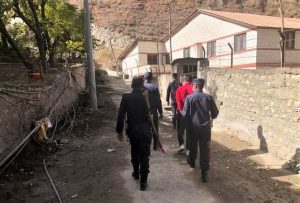NEW DELHI (Morning Star News) – A pastor in Nepal forced to pay exorbitant bail amounts for three separate cases was sentenced to two years in prison on Nov. 30 under a law against proselytizing, sources said.
The Dolpa District Court sentenced 33-year-old pastor Keshab Raj Acharya of Abundant Harvest Church, Pokhara to two years in prison and a fine of US$167 under the country’s proselytization law. It was the country’s first conviction for proselytizing under the criminal code that went into effect in Nepal in August 2018.
Pastor Acharya’s wife said she was shocked that he was convicted and unexpectedly sent to prison the same day, Nov. 22, a week before formal sentencing on Nov. 30.
“Keshab went to the court for his regular hearing. We had no idea that he would be convicted that day and not return home,” Junu Acharya told Morning Star News. “We were completely shaken at the news of his arrest. I had not even imagined in the wildest of my dreams that this could happen. He had not forced anybody to change their religion, so I was confident that he would never have to go to jail for something that he has not done.”
Pastor Acharya was granted bail pending appeal on Dec. 19 and reached home on Friday (Dec. 24), reuniting with his family on Christmas Eve.
The pastor had spent nearly four months in jail after his initial arrest last year, and he has since paid three bail amounts considered exorbitant in Nepal for three separate cases. First arrested on March 23 on charges of spreading false information for saying prayers can heal the novel coronavirus, pastor Acharya had been released on April 8 only to be re-arrested moments later on charges of “outraging religious feelings” and “proselytizing.”
He was released on July 3 after paying bail equal to about US$2,500, sources said.
Harassment
Junu Acharya said prosecution of her husband was a government tactic to make an example of him as a sign to Nepal’s Christians of the consequences of spreading the gospel.
“I feel it is a pre-planned strategy, and that is why Pastor Keshab’s case has been stretched so much,” she said. “They have surrounded him from three sides and twisted the cases. It seems evident that he is being intentionally framed.”
She said that Hindu extremists are intimidated by the growth of Christianity in Nepal.
“They feel that if more and more people become Christian, their religion will go extinct,” she said. “Pastor Keshab’s arrest and conviction is a message to the Christian community at large. They feel that if they punish Keshab, others will see and learn a lesson from his conviction. So, they have intentionally targeted him.”
Junu Acharya said the police investigation found one person who claimed that Pastor Acharya had tried to convert him.
“One person came forward and said that Pastor Keshab had given him a religious tract in Dolpa and asked him to follow his religion,” she said, adding that he had indeed gone to Dolpa and distributed tracts but did not ask anyone to forsake their religion for Christianity or offer any allurements such as money.
“He distributed tracts to many people that day,” Junu Acharya said. “The people to whom he had distributed the tracts acknowledged before the police that they had been given the same, but they also mentioned that Acharya had not asked them to convert or follow his religion while handing over the tracts. They said that ‘He gave us a paper, we read it, tore it and threw it away,’ that’s all.”
The person that police said Pastor Acharya had asked to become a Christian did not show up in court, she said.
“There was no witness, not even one, who stood before the judge to confirm the allegation,” Junu Acharya. “And yet, I don’t know how, Keshab was found guilty and convicted.”
The general secretary of the Nepal Christian Society, the Rev. Dilli Ram Paudel, said authorities appeared to be biased.
“I felt that the judge was biased…He did not look at all the witnesses or practical law but gave judgment based on the police report,” Paudel told Morning Star News. “The police were also very biased in this case.”
The judge told Acharya’s attorney that they can appeal the verdict in the High Court, Junu Acharya said.
B.P. Khanal, national coordinator of Nepal for the International Panel of Parliamentarians for Freedom of Religion or Belief, concurred that Pastor Acharya’s arrest and conviction seemed to be a part of a pre-planned act against the Christian community.
“The manner that Acharya was arrested itself clarifies that the arrest was unjust and a pre-planned act against Christianity,” Khanal said.
Christian leaders in Nepal are appealing to the international community to help advocate for the convicted pastor. Paudel said Christians had prayed that Pastor Acharya would be released on bail by the High Court, and “we are also praying for financial support for his case.”
Though the pastor has attained bail, Junu Acharya said she was concerned he could be arrested and prosecuted for the Pokhara case.
Cases
Pastor Acharya was initially arrested on March 23, 2020, from his home in Pokhara, Gandaki Pradesh Province, after a video of him appeared on YouTube showing him spiritually rebuking the novel coronavirus while preaching during a church service.
Junu Acharya told Morning Star News that misinformation spread that the pastor had stated “If you become a Christian, you cannot get infected by COVID.” Pastor Acharya said nothing of the sort, she said.
The Kaski District Administration Office released Pastor Acharya on bail of 5,000 Nepalese rupees (US$41) on April 8, 2020, only to re-arrest him moments after his release on charges of “outraging religious feelings” and “proselytizing,” according to court documents.
On April 19, 2020, the Pokhara Kaski District judge set an exorbitant bail of 500,000 Nepalese rupees (US$4,084), his wife said. When he was released on bail on May 13, 2020, he was immediately re-arrested on a third set of charges at the courthouse and transferred 400 miles to a jail in Dolpa District, a three-day trip.
The Dolpa District Attorney on May 21 filed charges under Section 158 (1) of the Nepal Criminal Code, which prohibits converting anyone from one religion to another, and Section 158 (2), which prohibits undermining one’s religion with the intention of converting another person.
Pastor Acharya’s bail application was rejected on May 22, 2020, and after the bail amount was later revised to 300,000 Nepali rupees (about US$2,500), he was released on July 3, 2020.
In a July 18, 2020 letter to Nepal’s attorney general, the International Religious Freedom Roundtable described Pastor Acharya’s arrest as “arbitrary” and “discriminatory” and called for charges against him to be dropped, according to the U.S. Department of State’s 2020 report on International Religious Freedom.
Though Acharya was free on bail for roughly a year, he had to present himself before the court three times each month, once for each case, to sign official documents, his wife said.
“He had to appear in Pokhara for two cases and had to go to Dolpa for his case registered in Dolpa,” she said. “It was quite an exhausting process – not only financially draining but also physically challenging.”
Dolpa District is in an isolated corner of Karnali Province, bordered by Tibet, that has no road links to other districts. Junu Acharya said it is very cold there, and there are no direct flights. If not flying, one has to take a vehicle halfway, ride a bike for many miles and then walk the rest of the way – a three-day trip.
Controversial Law
Though Nepal is a party to the International Covenant on Civil and Political Rights (ICCPR), Pastor Acharya’s case and other legal actions against Christians have raised grave concerns among Christian leaders in the country and international community.
Mukunda Sharma, executive secretary of the Nepal Christian Society, said Pastor Acharya’s conviction for proselytizing violates Article 18 of the ICCPR and other international treaties.
“This shows that minority rights have gone astray,” Sharma said. “The NSC condemns the incident and appeals for his release.”
Article 18 of the ICCPR states, “Everyone has the right to freedom of thought, conscience and religion; this right includes freedom to change his religion or belief, and freedom, either alone or in community with others and in public or private, to manifest his religion or belief in teaching, practice, worship and observance.
Evangelizing is prohibited under Nepal’s constitution of September 2015, as it was under the previous constitution, but the new one has helped incite anti-Christian sentiment. The constitution and Nepal’s Criminal Code that came into effect in 2018 put excessive restrictions on freedom of religion or belief and criminalize attempts to convert others, thus violating the right of religious communities to share the tenets of their belief, Christian leaders say.
The 2018 legislation faced strong opposition from the Christian community in Nepal before it became law, and Pastor Acharya’s case sets a dark precedent, said pastor Tanka Subedi, chair of the Religious Liberty Forum Nepal (RLFN).
“Acharya’s case is the first sentence under the democratic, secular constitution of Nepal,” Subedi told Morning Star News. “The judgment is unjust, as it undermines the spirit of the constitution of Nepal. It compromises freedom of speech, freedom to profess one’s faith and suppresses the minorities.”
While Nepal’s new constitution establishes a secular and democratic republic, its definition of “secular” appears to protect Hinduism, and Article 26 forbids anyone to convert a person of one religion to another.
While evangelizing has long been illegal in Nepal, advocacy groups have detected increased enforcement and other anti-Christian efforts since 2018 as officials sought to placate Hindus incensed that the new constitution did not re-establish a more prominent place for Hinduism.
Under the new criminal code, those convicted of either evangelizing or forcible conversion can be imprisoned for up to five years and fined 50,000 rupees (US$450).
While Article 26 (1) of Nepal’s Constitution protects freedom of religion or belief and includes the rights to profess, practice and protect one’s religion, Article 26 (3) of states:
“No person shall, in the exercise of the right conferred by this Article, do, or cause to be done, any act which may be contrary to public health, decency and morality or breach public peace, or convert another person from one religion to another or any act or conduct that may jeopardize other’s religion and such act shall be punishable by law.
The Christian community of Nepal has faced several cases demonstrating the ease with which the constitution’s anti-conversion laws can be misused. There also has been a substantial increase in the number of aggressions against religious minorities, especially Christians, beginning in 2018. These have included bombings and arson attacks on churches, physical assaults on Christians, false accusations alleging evangelism and conversions and false propaganda against Christians.
By criminalizing conversions, Nepal has infringed on the fundamental freedom of religion or belief guaranteed not only by its constitution but also by several international covenants, according to Alliance Defending Freedom, which undertakes legal advocacy for religious freedom.
“These vaguely defined laws are often abused to harass minorities,” according to an ADF press statement. “While the Indian constitution is very clear on protecting religious freedom, Nepal’s constitution prohibits the attempt of religious conversion. At the same time, Nepal is a signatory to the International Covenant on Civil and Political Rights, an international treaty explicitly protecting freedom of religion and expression.”
Nepal ranked 34th on Christian support organization Open Doors’ 2021 World Watch List of the 50 countries where it is most difficult to be a Christian.
Facing the Odds
After hearing the verdict, Pastor Acharya called his wife, telling her to “take courage” care for the congregation, she said.
Junu Acharya said he told her, “You take courage…. Don’t be afraid…. God’s will be done. They cannot hold me inside; without God’s will, not a leaf can move. This must be God’s plan, and thus I am being sent inside. Don’t weep for me, pray for me. Take care of the church…Take care of the believers.”
When the pastor was jailed in May 2020, his wife had to shut down their church in Pokhara because of the high rent they could no longer afford. The rent is 25,000 Nepalese rupees monthly, she said.
Junu Acharya is leading church at two sites, one on the couple’s land in Pokhara – which they started a few months ago, attended by about 80 members – and one about nine miles away, established five years ago with about 400 people worshipping there.
Their children dearly miss their father, she said.
“My children are very attached to their father, whom they call ‘Baba’. They are eagerly waiting for his return and making plans for an outing with him,” Junu Acharya said. “I feel deeply for them, but with God’s grace I pull on, knowing that everything is in His control.”
If you would like to help persecuted Christians, visit http://morningstarnews.org/resources/aid-agencies/ for a list of organizations that can orient you on how to get involved.
If you or your organization would like to help enable Morning Star News to continue raising awareness of persecuted Christians worldwide with original-content reporting, please consider collaborating at https://morningstarnews.org/donate/?
###
© 2021 Morning Star News. Articles/photos may be reprinted with credit to Morning Star News. https://morningstarnews.org
Tweet: https://twitter.com/morningstarnewz/
Facebook: https://www.facebook.com/MorningStarNews
Morning Star News is a 501(c)(3) non-profit corporation that relies solely on contributions to offer original news reports of persecuted Christians. By providing reliable news on the suffering church, Morning Star News’ mission is to empower those in the free world to help and to encourage persecuted Christians that they are not forgotten or alone. For free subscription, contact [email protected]; to make tax-deductible donations, visit https://morningstarnews.org/donate/? or send check to Morning Star News, 728 A Kodiak St., Eielson AFB, AK 99702, USA.
The post Pastor in Nepal Sentenced to Prison under Proselytism Law appeared first on Morningstar News.
Become a Christian News Network Supporter…

 Dear Reader, has ChristianNews.net been of benefit and a blessing to you? For many years now, the Lord has seen fit to use this small news outlet as a strong influential resource in keeping Christians informed on current events from a Biblical worldview. With much compromise and many falsehoods in modern-day Christianity, we strive to bring you the news by keeping Christ and His word in focus. If you have benefited from our news coverage, please prayerfully consider becoming a Christian News supporter by clicking here to make a one-time or monthly donation to help keep the truth of God’s word widely and freely published and distributed. May Christ continue to be exalted through this work!
Dear Reader, has ChristianNews.net been of benefit and a blessing to you? For many years now, the Lord has seen fit to use this small news outlet as a strong influential resource in keeping Christians informed on current events from a Biblical worldview. With much compromise and many falsehoods in modern-day Christianity, we strive to bring you the news by keeping Christ and His word in focus. If you have benefited from our news coverage, please prayerfully consider becoming a Christian News supporter by clicking here to make a one-time or monthly donation to help keep the truth of God’s word widely and freely published and distributed. May Christ continue to be exalted through this work!Related posts:
Views: 0
 RSS Feed
RSS Feed

















 December 26th, 2021
December 26th, 2021  Awake Goy
Awake Goy 






 Posted in
Posted in  Tags:
Tags: 
















